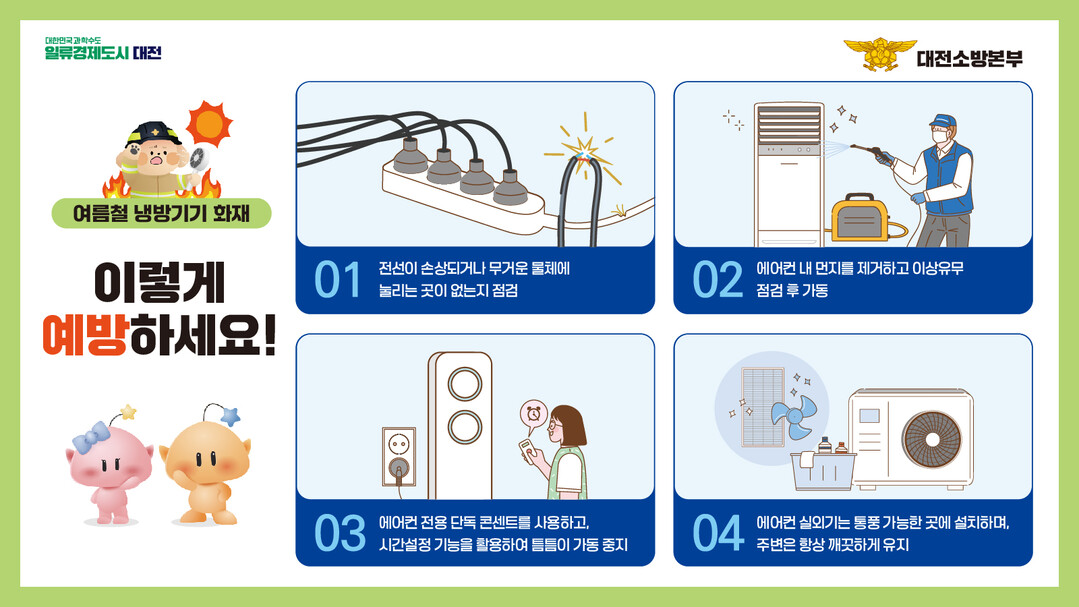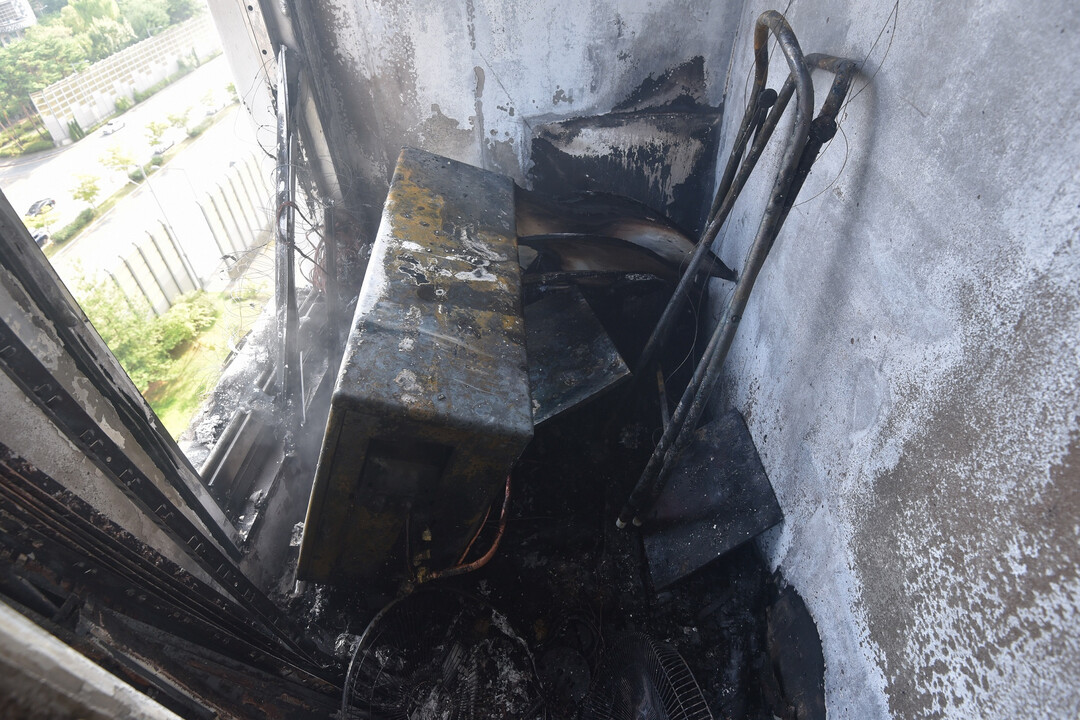
With the onset of the scorching heat, air conditioner usage is surging, raising concerns about cooling appliance-related fires. The Daejeon Fire Department reported that over the past three years (2022-2024), a total of 26 air conditioner fires occurred in the Daejeon area, resulting in one injury and approximately 53 million KRW in property damage. Notably, 14 fires occurred in 2024, showing a significant increase compared to the previous year. This indicates that as summer air conditioner usage rises, so does the risk of fire.
Air Conditioner Fires: Why and Where Do They Occur?
The overwhelming majority of air conditioner fires are attributed to electrical factors. A staggering 74% of all fires (20 cases) were caused by electrical problems, with factors like old or damaged wiring, octopus-style power strip usage, and overloading being cited as primary culprits. This was followed by 4 cases (14.8%) of unknown cause, 1 case (3.7%) due to mechanical factors, and 1 case (3.7%) due to carelessness.
Residential facilities accounted for more than half of the fire locations, with 14 cases (approximately 52%), making them the most vulnerable. Sales/business facilities followed with 6 cases (22.2%), and daily living service facilities with 4 cases (14.8%). This concentration in frequently used living spaces implies that we are constantly exposed to the risk of air conditioner fires in our daily lives. A case in March where an air conditioner electrical wiring issue in a building in Wonnae-dong, Yuseong-gu, caused approximately 4 million KRW in damage, once again emphasizes the importance of pre-inspection before full-scale cooling operations begin.

How Can Air Conditioner Fires Be Prevented?
The Daejeon Fire Department urges adherence to the following safety guidelines to prevent air conditioner fires. Active public participation is key to fire prevention.
Wiring Inspection and Single Circuit Use: Air conditioner wiring should, in principle, use a single circuit. Using multi-taps increases the risk of fire by causing overload. Additionally, regularly inspect wires for damaged insulation or aging, and immediately replace any damaged wires. Be careful of bent or pinched wires, as they can cause internal disconnections.
Outdoor Unit Area Management: Keep the area around the air conditioner's outdoor unit free of flammable materials (e.g., paper boxes, clothing, plastic). The outdoor unit generates high heat during operation, and accumulated dust or debris can cause fires. This is especially crucial for outdoor units installed on commercial building exteriors, where there's a significant risk of external ignition from cigarette butts. Therefore, maintain a clean environment around the outdoor unit and be particularly careful about removing combustibles.
Regular Cleaning and Function Checks: Periodically remove dust from air conditioner filters and clean the inside of the outdoor unit. Accumulated dust not only reduces cooling efficiency but can also lead to overheating. If the air conditioner makes strange noises, emits unusual smells, or its cooling capacity significantly drops, it's essential to have a professional inspect it.
Outdoor Unit Vent Opening: Always open the vents of the outdoor unit compartment when the air conditioner is running. The outdoor unit's role is to dissipate heat, and inadequate ventilation can lead to overheating and an increased fire risk. It is very dangerous to keep the doors closed for outdoor units installed in verandas or utility rooms.
Professional Inspection: If there's an issue with the air conditioner's outdoor unit or main body, do not attempt to repair it yourself. Always seek professional inspection. Incorrect self-repairs can lead to greater malfunctions or fires. Professional help is particularly essential if air conditioner gas leaks or refrigerant is low.
"Unwelcome Summer Guest" - Air Conditioner Fires: Public Awareness and Action Are Crucial
Ahn Jung-mi, Head of the Prevention and Safety Division at the Daejeon Fire Department, stated, "Summer cooling appliances can lead to fires if one is careless," urging citizens to "consistently practice basic safety rules that anyone can follow in their daily lives."
Due to recent climate change, summer temperatures are becoming even higher, making air conditioner usage a necessity rather than an option. However, a cool summer cannot be enjoyed without the safe use of air conditioners. It is crucial to internalize the aforementioned safety rules to protect precious lives and property. Furthermore, for old air conditioners, check their replacement timing through professional inspection, and when installing new air conditioners, meticulously ensure that appropriate wiring is used and the outdoor unit is installed safely. Summer air conditioner fires are a fully preventable disaster. The collective awareness and action of all citizens are the most reliable ways to spend this summer safely and comfortably.
[Copyright (c) Global Economic Times. All Rights Reserved.]






























